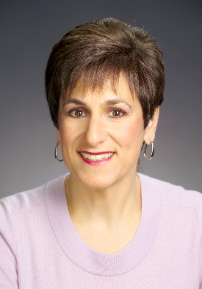 Sally Palaian, PhD is a Michigan-based psychologist and author of Spent: Break the Buying Obsession and Discover Your True Worth. She talked to WTCI via email about working with clients who struggle with spending.
Sally Palaian, PhD is a Michigan-based psychologist and author of Spent: Break the Buying Obsession and Discover Your True Worth. She talked to WTCI via email about working with clients who struggle with spending.
What’s your background? What do you do now?
I grew up in a financially dysfunctional home — so in young adulthood I was on my own to figure out how to make my way with the financial aspect of life. I found a therapist who recognized that the financial dysfunction from my childhood was similar to having alcoholism in the home. That gave me a framework for my struggles and helped lessen my personal shame about my financial confusion. From there, I was somewhat self-taught and read all types of books about money and money management.
After years of my own financial recovery, my therapist friends started asking me to help them with their finances. At first, I declined the requests. Then one week, two friends (from different parts of my life) mentioned to me that I should be lecturing others on this topic, I thought perhaps the universe was talking to me, and maybe I should listen!
So, I began to give talks and presentations to people to help them organize finances, make spending plans, stop compulsive shopping, visualize futures, learn to balance the material and spiritual parts of life, develop sensible debt repayment plans, increase incomes, and other areas unique to individuals.
Then I wrote a book on the topic because many folks who called me for help couldn’t afford to pay for my services. I decided to put all my ideas into a book that was practical and affordable.
For most of my career my psychology private practice has been focused on trauma and addictions of all sorts: compulsive eating and eating disorders, sexual addictions, alcohol and drugs, relationships and codependency and now I do money coaching. I also love to do marriage counseling using Imago Relationship Therapy — sometimes couples are referred to me to work with marital money issues.
Many clinicians find it difficult to talk about money with clients. How can clinicians best address money issues in session?
The first step for clinicians is to clean up your own side of the street about money — explore your own countertransference issues about money — look at childhood messages about money, look at your own money patterns and behaviors, are you where you want to be financially? Also get clean about how you view your financial dependency on clients. If clinicians take a look at their own finances, it makes it much easier to enter the terrain of a client’s money.
After this, money discussions begin during the initial phone call when there’s discussion of fees. I tell clinicians — do not miss this opportunity to clarify the financial arrangements at the outset (late cancels, method of payment, etc.) — this is when you lay the foundation for future discussions about money. It’s particularly important if a potential client is trying to arrange a “sliding fee” — ‘cause if they have you lowering your rate for them, and they are overspending, it sets up a dynamic whereby the client won’t be able to be honest with you about their purchases.
It’s also important to ask pointed questions about a person’s financial situation/circumstances/habits as part of the assessment. Also ask about how their parents handled money, as well as the behavior of their spouse or grown children. What is their greatest financial success? What is their greatest financial disappointment?
After that, I probe whenever they make references about spending money, giving gifts, feeling pressure about debt, liking or not liking their job, their spouses financial behaviors, their kids borrowing money from them, etc. I ask pointed questions: Could they afford that purchase? Do they think they are spending too much? Have they saved for retirement before loaning money to their children? Have they made a budget? Are they in debt?
What criteria do you use to identify a client who qualifies as a money addict?
In order to label someone as a full blown money addict, I look to addiction criteria from the DSM, or Alcoholics Anonymous — looking at the behaviors to see if they have grown worse over time, the person is more and more preoccupied with the dysfunctional behaviors, if they can’t stop even though they promise themselves they want to stop, etc. I have more of them outlined in my book.
However, there are a lot of folks on the slippery slope to addiction, but don’t yet qualify with the above criteria. These folks have money disorders — some of which can be changed with some behavior modifications, some insight therapy, some accountability and honesty to family members, and some financial education. If clinicians are proactive, they help these people (not slip deeper) by not being afraid to probe their money issues. I think that many clinicians enable dysfunctional money behaviors by tiptoeing around the topic. We do clients a great disservice if we are shy to ask.
How do you tailor treatment for a money addict?
I have them begin to record their spending, gather financial documents so they can see the debt totals, make commitments to not use credit cards, we take a look at impulsive purchases, or other ways they sabotage their success, explore the chronology of the dysfunctional money behaviors, and take a look at childhood also. We are making practical life changes while exploring the underlying things like: what money means to them, what “image” and “selfhood” mean to them, what security means to them, who are they punishing by being so unsuccessful with their finances?
How have you integrated Imago Therapy and money addiction focus in couples therapy?
If couples are stuck in money power struggles, Imago Therapy is extremely useful to help people explore their money history with each other. I have the couple make a map or blueprint of their childhood money scripts:
- What their parents believed about money
- How their parents were in alignment or not about financial decisions
- Did the parents have similar values about how to spend money
- Who made the money, who spent the money
- Did anyone withold or splurge with money
- Were there secrets about money
- Was there fighting about money
- Were there promises made but not kept with finances
- What were the actual financial circumstances in childhood
- How did they experience their financial circumstances as a kid — some folks are happy with what happened, others aren’t.
- Financial behaviors are sometimes influenced by generations before — so I’ll ask also to go back to the generation before or any other unusual circumstances of the previous generations.
After each person has an understanding of where the other person comes from, I then have them dialogue their disappointments/frustrations/expectations with each other — then from that we discuss how each person would like the family finances to be different, and then we talk about what actions could be taken to get to that place. I do some processing of feelings and some behavioral intervention work.
If there’s a lot of money dysfunction in either individuals past — we’ll do parent-child dialogues — to give each person the opportunity to work through their feelings toward the parent with the dysfunctional behaviors. Sometimes folks plain and simple don’t have money skills because they were never taught healthy skills, sometimes their own behaviors are in reaction or rebellion to the parents skills or values. Imago Therapy is a great forum to flesh out the origin of the differences — if couples understand their partner, it’s easier to become a stronger financial team and work toward dreams together.
The global financial changes are awakening lots of folks. We’re on the threshold of new discoveries about money and materialism in this culture. These are such exciting times to be exploring our financial patterns and beliefs. I love to inspire folks to take a look both inside themselves about their values, how they can find balance between materialism and spirituality, and ultimately how to be happy in this wonderfully abundant world!
Find Sally Palaian, PhD on the web at sallypalaian.com. Her book is Spent: Break the Buying Obsession and Discover Your True Worth.

Leave a Reply
You must be logged in to post a comment.